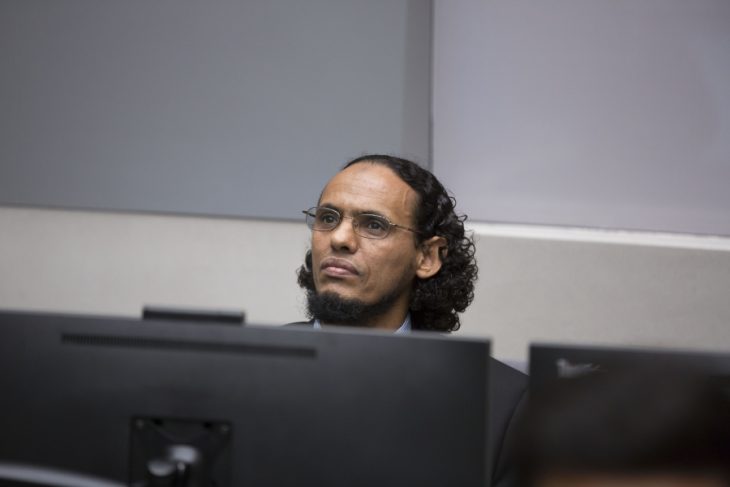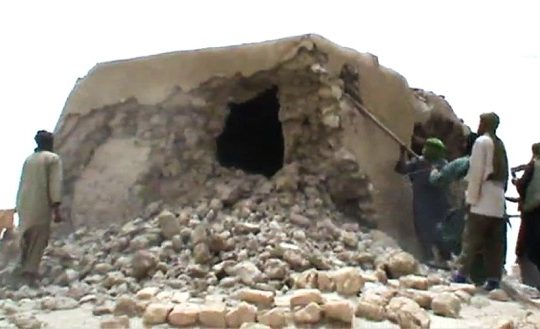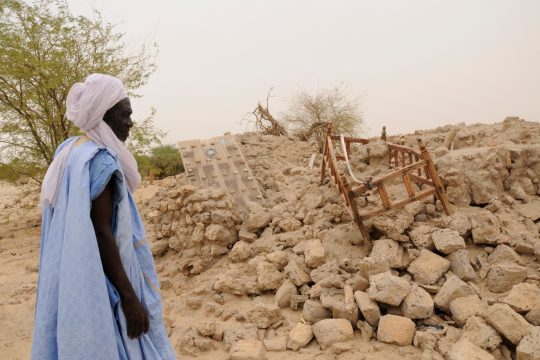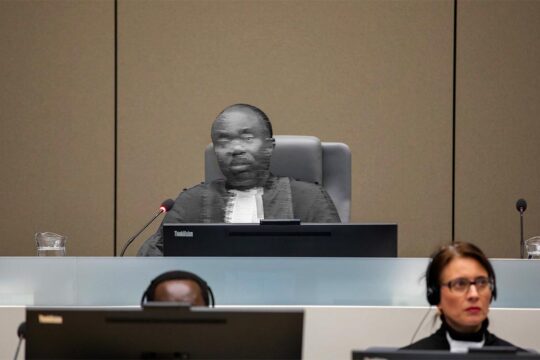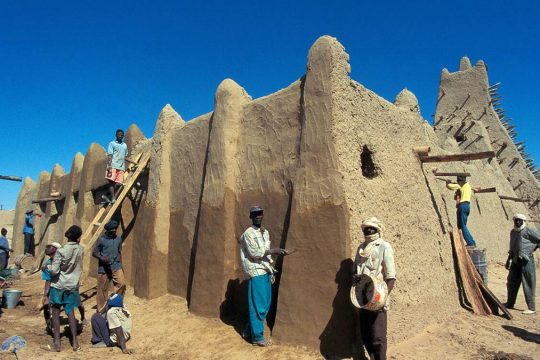Malian former Jihadist Ahmed Al Mahdi pleaded guilty on Monday as his trial opened at the International Criminal Court (ICC). He faces a single war crimes charge for the destruction of nine mausoleums and part of the Sidi Yahia mosque during the occupation of Timbuktu by Jihadist groups between April 2012 and January 2013. He could face up 30 years in jail.
“I plead guilty,” said Al Mahdi as he embarked on his explanations at the trial opening. He told the court he was doing so with “great regret and pain” because all the Prosecutor’s allegations were correct. Yes, he oversaw the destruction of nine mausoleums in Timbuktu and the main gate of the Sidi Yahia mosque which, according to legend, should not be opened until the end of the world. Yes, he supplied the tools that were used to destroy these monuments classified as world heritage. Yes, he prepared the Friday sermon to justify these attacks. In one of the videos from the time, he appears in a turban carrying a Kalashnikov and claims to be “acting on the orders of the Prophet”.
A “son who lost his way”
That was four years ago. He told the court the destruction of the mausoleums was not in line with his interpretation of Sharia Law. But, having quickly become advisor to the emirs of Al Qaeda and Ansar Dine on Islamic matters, he was consulted in early 2012 on the question of the mausoleums. He affirmed that their existence was illegal. However, he also told his bosses that that there was nothing in the Koran calling for them to be destroyed and that to do so might also provoke the anger of Timbuktu’s population. The emirs did not listen but ordered him as head of the Hisbah, the Islamic morality squad, to carry out the destruction. Ahmed Al Mahdi now speaks of this as a mistake and asks the people of Timbuktu to forgive “a son who lost his way”. Al Mahdi the Touareg lived for a long time in this city known as the “pearl of the desert”, wearing out his robes at the Koranic school as he gained a solid reputation in the religious community as an expert on Koranic issues. So now he is asking his former neighbours not to forget what he did for the community in the past.
Prosecutor calls for 9 to 11 years
A deal was sealed between prosecution and defence five months ago. Al Mahdi -- who was arrested in Niger on the night of October 9-10, 2014, in a convoy carrying arms from the Libyan south, and transferred to the ICC a year later --, “has wanted to plead guilty right from the beginning”, according to his lawyer Mohamed Aouini. In February 2016, the defence and prosecution reached an agreement under which the Prosecutor would ask for a prison sentence of only 9 to 11 years in jail. But the judges are not bound by it and the maximum sentence is 30 years. The judges must consider any cooperation by the Accused as a mitigating circumstance. But the public part of the agreement says nothing about such cooperation. Nevertheless, the Prosecutor is continuing her investigations into crimes committed in Mali since January 2012, and this former Ansar Dine member could be a key witness. Asked about his former allies, Ahmed Al Mahdi uttered a laconic single phrase. “I was influenced by deviant people in Al Qaeda and Ansar Dine” in 2012, he told the three judges.
Small fry?
Given the single war crimes charge brought by the prosecution and the fact that Ahmed Al Madhi was never a leader, he does not seem to be a “big fish”. An editorialist in Bamako even wrote regretfully that Al Madhi is just “small fry”. He is certainly not an Islamist leader but he was a member of Ansar Dine and, according to the Prosecutor, took part in many meetings from September 2012 with heads of armed groups, at a time when these occupiers of the north were still dreaming of taking southern Mali too. Ahmed Al Mahdi has not been charged in connection with the attacks that were part of that war, nor for the rapes and persecutions committed in Timbuktu. Several Malian human rights organizations and the International Federation for Human Rights (FIDH) said the charges were too little. In March 2015 they filed a complaint with the Malian judicial authorities, but the investigation has more or less stalled.
“A city disfigured”
As the trial opened, ICC Prosecutor Fatou Bensouda stressed the importance of this trial which has been backed by UNESCO. This trial is all the more important given the “destructive rage that marks our times”, she said, evoking also the destruction of cultural heritage in Palmyra, Syria. She said such acts were carried out by “groups whose goal is to eradicate any representation of a world that differs from theirs”. Speaking of Timbuktu, Bensouda said it was “a city that was disfigured so profoundly that its people were wounded to the depths of their soul”.
Timbuktu “played an essential role in the expansion of Islam in Africa,” the Gambian Prosecutor told the court. The mausoleums have been rebuilt since the Jihadists were chased out by a French force in January 2013, but once destroyed, “the restoration of cultural heritage never brings back its inherent value”, Bensouda said.
The Prosecutor continued to stress the importance of this trial. “Culture is who we are,” she said. “Our ancestors created paintings, sculptures, mosques, temples and other forms of cultural possessions all around us. They put their hearts and souls into the creation of such cultural heritage so that it represents the cultural identity of their times, and is passed on for the benefit of future generations. Indeed, this cultural heritage shapes the spirit and identity of our own generation and of generations to come. With the passage of time, they become archetypes of social memory from which individuals shape their identity and grow.”
The trial is expected to continue until the end of the week. The judges will withdraw for deliberation.



